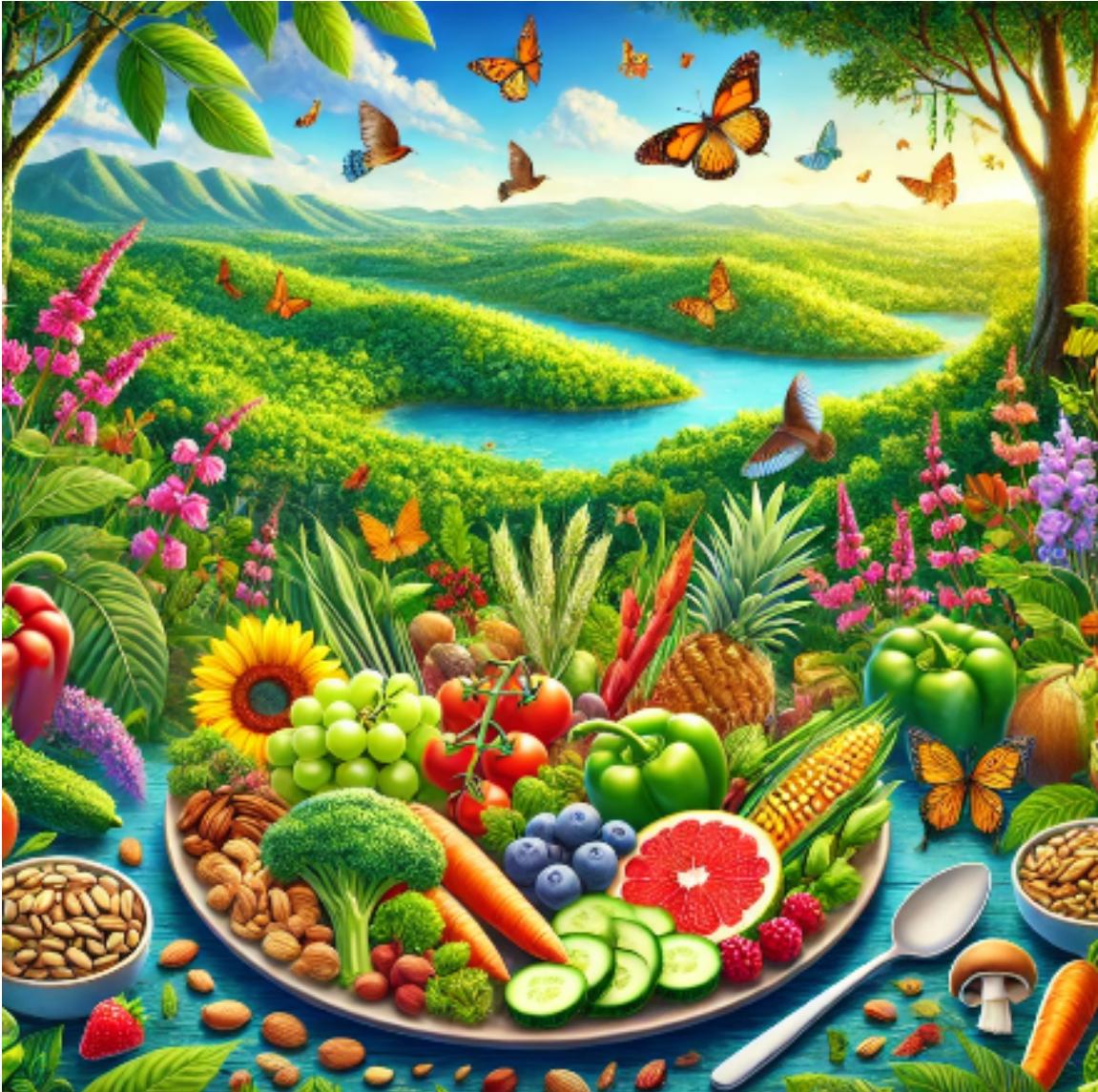By Joan Marie Gagnon
In recent years, the call to adopt more sustainable lifestyles has grown louder, with one particularly appetizing solution taking centre stage: embracing a plant-rich diet. Beyond the well-documented health benefits, such dietary choices play a pivotal role in preserving Earth’s biodiversity. By reducing reliance on animal-based foods and increasing the consumption of plant-based options, we can significantly mitigate the adverse effects of agriculture on our planet’s diverse ecosystems.
Biodiversity encompasses all the different kinds of living things on Earth, including plants, animals, insects, and even tiny bacteria. It’s like a giant puzzle, where every piece (species) plays a crucial role in maintaining the health of nature. For example, in a forest:
- Trees provide animals with homes.
- Bees help flowers grow by spreading pollen.
- Worms enrich the soil so more plants can grow.
If we lose too many pieces of the puzzle, nature won’t function as well. That’s why biodiversity is critically important.
The Agricultural Footprint on Biodiversity
While not all forms of agriculture are harmful, conventional agricultural practices are a leading driver of biodiversity loss, primarily through habitat destruction, pollution, and overexploitation of resources. Expanding agricultural lands often comes at the expense of forests, wetlands, and other vital habitats, leading to the displacement or extinction of countless species. Notably, agriculture threatens 24,000 of the 28,000 species listed as at risk of extinction by the International Union for Conservation of Nature (IUCN). Sustainable agriculture that enhances biodiversity focuses on regenerative and ecologically integrated practices.
Livestock farming, in particular, demands extensive land and water resources. Approximately 77% of global agricultural land is dedicated to livestock production, yet it provides only 18% of the world’s caloric intake. This disproportionate use of resources underscores the inefficiency of animal-based food systems and their substantial impact on natural habitats.
Substantial investment must be made now to transition ranchers so they are not harmed by the reduction in animal agriculture and are included in the process. While this transition won’t be easy, it could yield enormous benefits. According to Oxford University and the Food Systems Economics Commission (FSEC), moving to sustainable food systems could generate up to $10 trillion USD annually in benefits.
Many organizations, such as Transfarmation and Global Roots, are helping to make that shift.
Plant-Rich Diets: A Path to Conservation
Shifting toward plant-rich diets offers a tangible solution to curb biodiversity loss. Reducing the demand for animal products can alleviate pressure to convert natural ecosystems into grazing lands or feed crop plantations. This transition not only preserves habitats but also promotes the sustainable use of resources.
Research indicates that increasing the adoption of plant-based diets could significantly contribute to limiting global warming. A study published in PLOS Climate suggests that reducing reliance on animal-based foods could lower carbon dioxide emissions by 68% through 2100—achieving 52% of the reductions needed to keep global temperature rise below 2°C. Such dietary shifts help mitigate climate change and benefit biodiversity by reducing pressure on natural ecosystems.
The Role of Diverse Plant Consumption
Embracing a variety of plant foods not only enriches our diets but also supports agricultural biodiversity. The Mediterranean dietary pattern, for example, is known for its environmental and economic sustainability, largely due to its focus on diverse plant-based foods. By incorporating underutilized crops into our diets, we can promote agricultural diversity, reduce monocultures, and enhance ecosystem resilience.
Practical Steps Toward a Plant-Rich Diet
Transitioning to a plant-rich diet doesn’t mean eliminating all animal products. Even modest reductions in meat consumption can yield substantial benefits for biodiversity. Try these simple steps:
- Incorporate more plant-based meals into your routine
- Explore new fruits, vegetables, grains, and legumes
- Choose sustainably sourced and locally grown products
Conclusion
Adopting a plant-rich diet presents a delicious and impactful avenue to support Earth’s biodiversity. By making mindful food choices, we can reduce the strain on natural habitats, promote sustainable agriculture, and enjoy numerous health benefits. It’s a win-win scenario—our plates become instruments of positive change for the planet.
Rainbow Quinoa Salad
A vibrant, nutrient-packed salad that’s great for both biodiversity and your health!
Ingredients:
- 1 cup quinoa, rinsed
- 2 cups water or vegetable broth
- 1 cup cherry tomatoes, halved
- 1/2 cup cucumber, diced
- 1/2 cup bell peppers (red, yellow, or orange), diced
- 1/4 cup red onion, finely chopped
- 1/4 cup fresh parsley or cilantro, chopped
- 1/4 cup toasted sunflower seeds or chopped almonds
- 1/4 cup pomegranate seeds (optional)
Dressing:
- 3 tbsp olive oil
- 1 tbsp lemon juice
- 1 tsp maple syrup or agave
- 1/2 tsp Dijon mustard
- Salt and pepper to taste
Instructions:
- In a medium pot, bring water or broth to a boil. Add quinoa, reduce heat, cover, and simmer for 12–15 minutes, until fluffy. Let cool.
- In a large bowl, combine quinoa, vegetables, seeds, and herbs.
- Whisk dressing ingredients and pour over salad. Toss well.
- Chill for 30 minutes or serve immediately.
By Joan Marie Gagnon—Joan is an active member of the Foxboro, MA Rotary Club and ESRAG’s Plant-Rich Diet Task Force. She is a certified plant-based coach, co-founder of Veg Your Way—Health at Any Age, and holds a Plant-Based Nutrition certificate from eCornell.
The ESRAG Plant-Rich Diet Task Force is here to help individuals, clubs, and districts reduce their environmental impact and improve human health through healthier dietary choices. Visit our webpage for helpful resources or contact us at [email protected].
Like us on Facebook or Instagram, or take our 15-Day Plant-Rich Diet Challenge.

